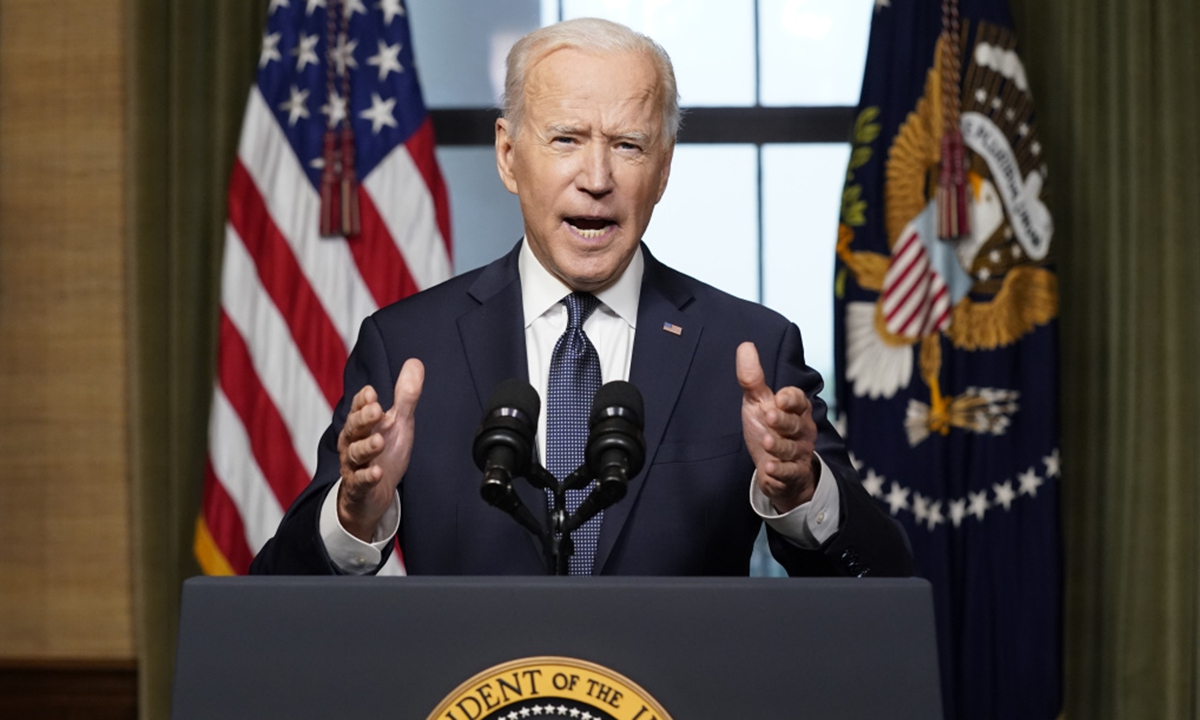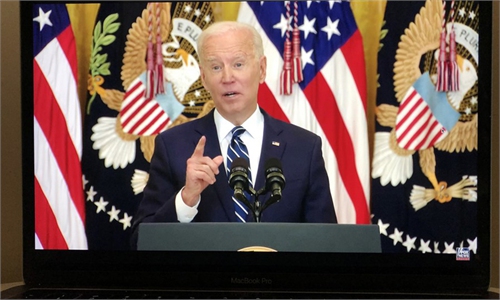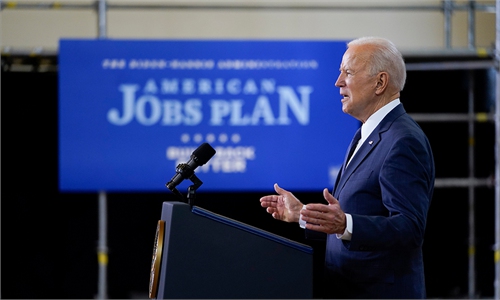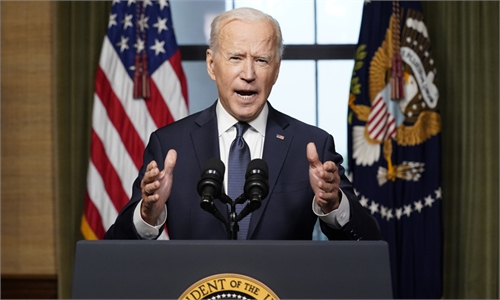
President Joe Biden speaks from the Treaty Room at the White House on Wednesday, April 14, 2021, about the withdrawal of the remainder of U.S. troops from Afghanistan. Photo: IC
Since taking office, the Biden administration has not ignored foreign affairs while coping with the domestic epidemic and economic crisis. US President Joe Biden has constantly chanted "America is back" and concentrated efforts on his China policy. Judging from the actions taken by the Biden administration during its first 100 days in power, its China policy is neither an Obamaism 2.0, nor a complete reversal of Trumpism.
Instead, it makes a compromise between the two. On the basis of the overall framework of strategic competition with China set by the Trump administration, it adds the policy line of multilateralism and alliance diplomacy. It is also conducting well-planned, effective and sustainable competition with China according to strength and status changes between China and the US. Such sophisticated and deliberate adjustments will have a more comprehensive and profound impact on China-US relations.
The Biden administration has set China as a long-term competitor of the US. At the same time it is not giving up dialogue and cooperation. US Secretary of State Antony Blinken said on March 3 that China is the world's "biggest geopolitical test" of the century. His remarks show there is no essential difference between the Biden administration and the Trump administration in their understanding of the so-called challenges posed by China. But the Biden administration has adopted more flexible approaches to deal with China and continues to seek cooperation with China in spheres such as addressing climate change. From the call between Chinese President Xi Jinping and US President Biden on February 11 to the China-US high-level talks in Alaska in March, and the recent joint statement on climate change, it can be seen that the Biden administration has made positive comments on the constructive and pragmatic nature of the bilateral exchanges. It also shows willingness to restart dialogue and cooperation in some areas, which is different from Trump's radical route of containing China.
The Biden administration has increased its efforts to contain China by consolidating the alliance system. Biden considers that the most effective way to address China's challenges lies in the establishment of a united front with allies and partners to compete with China "from a position of strength." With frequent telephone and video diplomacy and the sending of senior officials to visit major allies in Europe and Asia, the Biden administration is actively carrying out strategic coordination with allies over China-related issues. They have made concerted voices and actions on issues including human rights, Hong Kong, Taiwan and South China Sea, trying to exert strong external pressure on China to raise the cost of China's foreign policy.
The policy line of the Biden administration has shifted from the unilateral hegemonism to multilateralism. The Biden administration has rejoined the World Health Organization, the United Nations Human Rights Council, the Paris Agreement and so on, trying to compete with China for influence within international organizations and mechanisms and to ensure US dominance on the multilateral and regional stage. In addition, Biden also took over the Quad mechanism which was reactivated during the Trump era, and held the first summit to upgrade and strengthen the mechanism to confront China. On the issue of China, Biden has devoted considerable energy to lobbying China's neighbors, attempting to limit China's development and its influence to surrounding areas. This is a long-term containment plan and is more precise than Trump's.
Biden did not give up the ideological struggle against China, but instead has put "values-based diplomacy" in a prominent position in his China policy. Compared with the Trump administration that engaged in extreme anti-Communist and anti-China ideological offensive, the Biden administration focuses on making fuss with specific issues and strives to establish alliances of different scales. This is the most extensive ideological mobilization by the US since the end of the Cold War.
Although the Biden administration's China policy is still under adjustment, the overall framework has emerged. Regrettably, under the continuous interference of anti-China forces in the US, the Biden administration's tone over China-related issues tends to be negative, focusing more on competition and confrontation than cooperation. It does not fully realize the negative effect of its strategic competition against China and not perceive the long-term negative impact brought by the continuous deterioration of China-US relations. This will lay a hidden danger for the stable and healthy development of bilateral relations. The Biden administration should engage in dialogue and cooperation with China in a pragmatic and rational manner. This will not only benefit the two peoples, but also meet the common expectation of the international community.
The author is an assistant research fellow at the China Institute of International Studies.
The article was translated by Zhang Yuzheng of East China Normal University.



